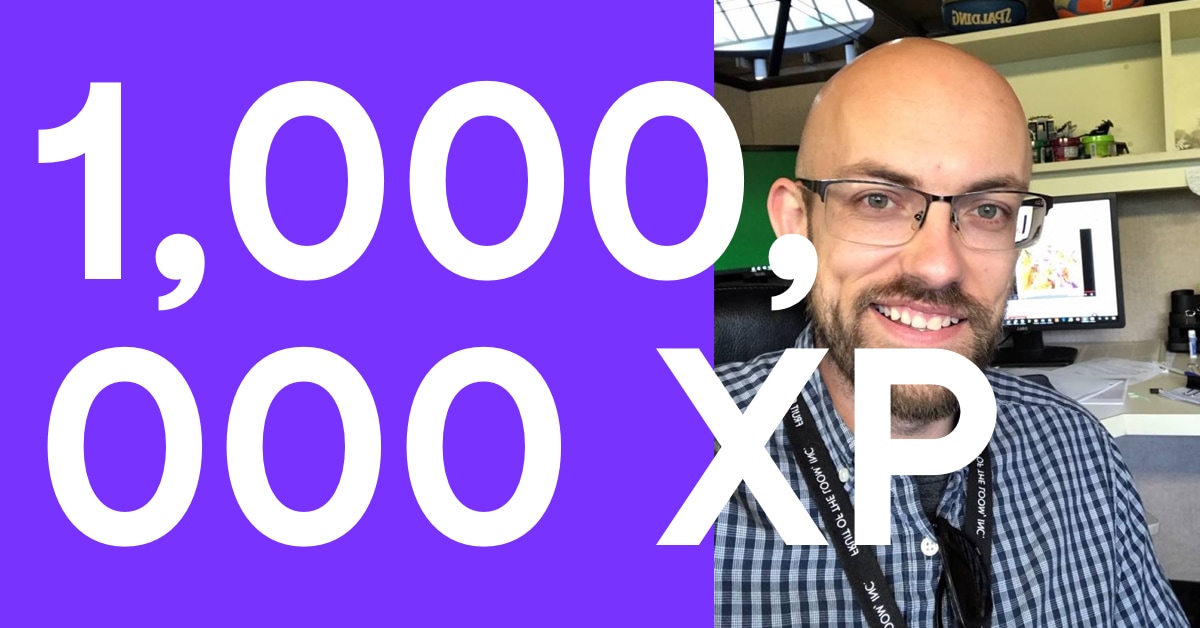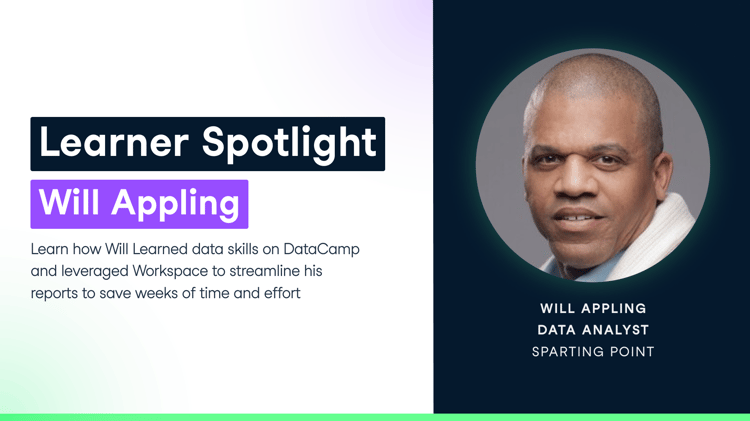

Cameron White is an analyst on the data science team at Fruit of the Loom and a DataCamp XP millionaire. His LinkedIn proudly broadcasts: “Over 200 courses, over 10,000 exercises, over a million XP, and nearly all skill tracks and career tracks completed on DataCamp.”
He’s also a busy single father with a young son, and time is his most precious commodity.
Becoming data-fluent with DataCamp
Today, Cameron is skilled in Python and R and proficient in many data science tasks, ranging from ETL to time series modeling to text analytics, and more. But five years ago, that wasn’t the case. He had just finished up a bachelor’s program in mathematics and statistics and most of his college work was very theoretical, with a few applied statistics courses thrown in. He landed an internship with Fruit of the Loom which turned into a full-time role on the newly created data science team. The problem? He had no idea what kind of tasks data scientists actually did or how they accomplished them.
I distinctly remember getting my job offer and hearing the term data scientist, but at the time I had no idea what that really was.
To prepare for his role at Fruit of the Loom, Cameron looked around for online platforms to build data science skills quickly. He tried one of our competitors but found that their courses “did not fit [his] needs as a student.” He found DataCamp in 2015 and was hooked almost immediately by our learn-by-doing approach.
I love that I can learn at my own pace with DataCamp.
Cameron appreciates the flexibility of the DataCamp platform, which allows him to have a seamless learning experience on desktop and mobile. He can conveniently learn whenever he has a 30-minute gap in his schedule, such as after he puts his son to bed. He also loves our video content and finds it “very short, but useful.”
He also loves the quality of our instruction—we only work with leading experts in data science, some of whom are actively creating and maintaining the tools and packages Cameron uses every day.
Many courses are taught by the creator of the package themselves! Who could be a better teacher than the package author?
The business impact of learning on DataCamp
Cameron tries to set aside an hour each day to learn on DataCamp, and he’s been able to apply his learnings directly to his work “on numerous occasions, sometimes even on the very next day!”
For instance, he had never heard of the Tidyverse prior to exploring our R curriculum, and today, his team uses tidy data principles “nearly every single day, on nearly every project.” He has also used many of the modeling methodologies taught on DataCamp in a variety of price modeling scenarios.
After taking Data Manipulation in R with dplyr, Cameron experienced a huge performance increase, both in the processing time of large datasets as well as coding time. These skills were easy to implement and he eagerly shared his learnings with his coworkers, helping to build internal enthusiasm for R and dplyr.
One major project he’s worked on is a predictive analytics collaboration with Microsoft. They found that a temperature drop of 12 degrees within six days directly incentivizes a massive number of consumers to purchase cold-weather clothing. These findings allowed them to proactively prepare their supply chain to meet different geographical needs and optimize sales of Fruit of the Loom’s fleece and other cold-weather products. For this project, Cameron and his team applied many learnings from DataCamp’s courses focused on SQL, importing and cleaning data in R, and advanced modeling.
Saving 196 workdays with DataCamp
The impact of DataCamp on Cameron’s work has been massive. Let’s look at how much time he’s saved by his own account after four years of learning on DataCamp.
- Cameron works roughly 200 days per year, so about 800 days over four years. Of those 800 days, he assumes that roughly 20% of his time has been spent actively coding, bringing us to 160 workdays (or 1,280 work hours).
- Of the active coding time, he assumes that roughly 40% (or 512 hours) has been spent doing exploratory data analysis that was sped up with Tidy concepts learned from DataCamp. Of those 512 hours, he assumes that using Tidy principles has saved roughly half of the time spent.
- In the other 60% of Cameron’s time, about 10% has been spent helping others with their coding questions—a major reduction since his team started to use DataCamp.
- Cameron estimates that the remaining time, close to 700 hours, has been spent doing more advanced work such as modeling using concepts from our courses on the caret package, making Shiny apps, or pulling in data from the web. He gives special credit to our course on Writing Efficient R Code by Colin Gillespie, which was a huge help in improving his runtime.
- Based on Cameron’s rough estimate, he saw a gain of 675 hours in his direct coding per year. This doesn’t even include the very large speedup in time saved during non-coding sessions, such as when his team first outlines a project. New methodologies learned on DataCamp have added substantial speedup in this phase. He estimates that he’s saved 70% of the time or 896 hours.
In total, Cameron has saved an estimated 1,571 work hours or 196 workdays over the last four years! As we mentioned at the top of this article, time is Cameron’s most precious commodity—so he’s very good at maximizing it.
How DataCamp encourages collaboration
Cameron’s team makes good use of their DataCamp subscriptions to learn new topics when they have free time at work. They can be pretty competitive and sometimes challenge each other on DataCamp XP, which helps to “keep things interesting.”
Additionally, the team has formal goals of meeting a certain number of training hours every year, and they primarily use DataCamp to do so.
The team’s growth is apparent based on the number of new methodologies, algorithms, and processes that we are discovering on the site.
Helping teams map their journey toward data fluency
For Cameron, the most difficult part of beginning his career in data science was knowing where to begin and where to focus his efforts. He feels that DataCamp does a terrific job of guiding his learning with our skill tracks and career tracks.
Data science is an extremely interesting, fun, and rewarding career path, and DataCamp’s platform helped me tremendously in succeeding in this field.
Learn more about Cameron’s data fluency journey, and connect with him on LinkedIn and Twitter.
To evaluate how DataCamp can help your team become proficient in data science and analytics, visit datacamp.com/business or schedule a demo of our platform.


